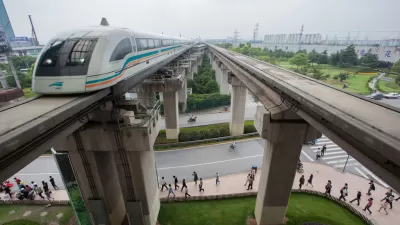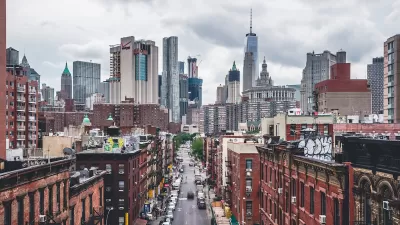Cities are growing faster than you can say megalopolis. But as populations around the world shift to urban areas, cities are also focal points for global challenges—water, energy, health. MIT is working to address these issues.

More than half the world lives in cities, and by 2050, it will be two-thirds. In China alone, 300 million people will move to the city within the next 15 years, and to serve them, China must build the equivalent of the entire built infrastructure of the United States by 2028.
Beyond the basic needs from housing to jobs, how do we enjoy the benefits of the city—like cafes, art galleries, restaurants, cultural facilities—without the traffic, crowding, crime, pollution, and disease?
Dozens of MIT faculty are now working to figure it out. The winter issue of MIT’s publication, Spectrvm, showcases MIT researchers who are making cities more livable, efficient, and sustainable.
FULL STORY: MIT Spectrum

Planetizen Federal Action Tracker
A weekly monitor of how Trump’s orders and actions are impacting planners and planning in America.

Maui's Vacation Rental Debate Turns Ugly
Verbal attacks, misinformation campaigns and fistfights plague a high-stakes debate to convert thousands of vacation rentals into long-term housing.

Restaurant Patios Were a Pandemic Win — Why Were They so Hard to Keep?
Social distancing requirements and changes in travel patterns prompted cities to pilot new uses for street and sidewalk space. Then it got complicated.

In California Battle of Housing vs. Environment, Housing Just Won
A new state law significantly limits the power of CEQA, an environmental review law that served as a powerful tool for blocking new development.

Boulder Eliminates Parking Minimums Citywide
Officials estimate the cost of building a single underground parking space at up to $100,000.

Orange County, Florida Adopts Largest US “Sprawl Repair” Code
The ‘Orange Code’ seeks to rectify decades of sprawl-inducing, car-oriented development.
Urban Design for Planners 1: Software Tools
This six-course series explores essential urban design concepts using open source software and equips planners with the tools they need to participate fully in the urban design process.
Planning for Universal Design
Learn the tools for implementing Universal Design in planning regulations.
Heyer Gruel & Associates PA
JM Goldson LLC
Custer County Colorado
City of Camden Redevelopment Agency
City of Astoria
Transportation Research & Education Center (TREC) at Portland State University
Jefferson Parish Government
Camden Redevelopment Agency
City of Claremont





























